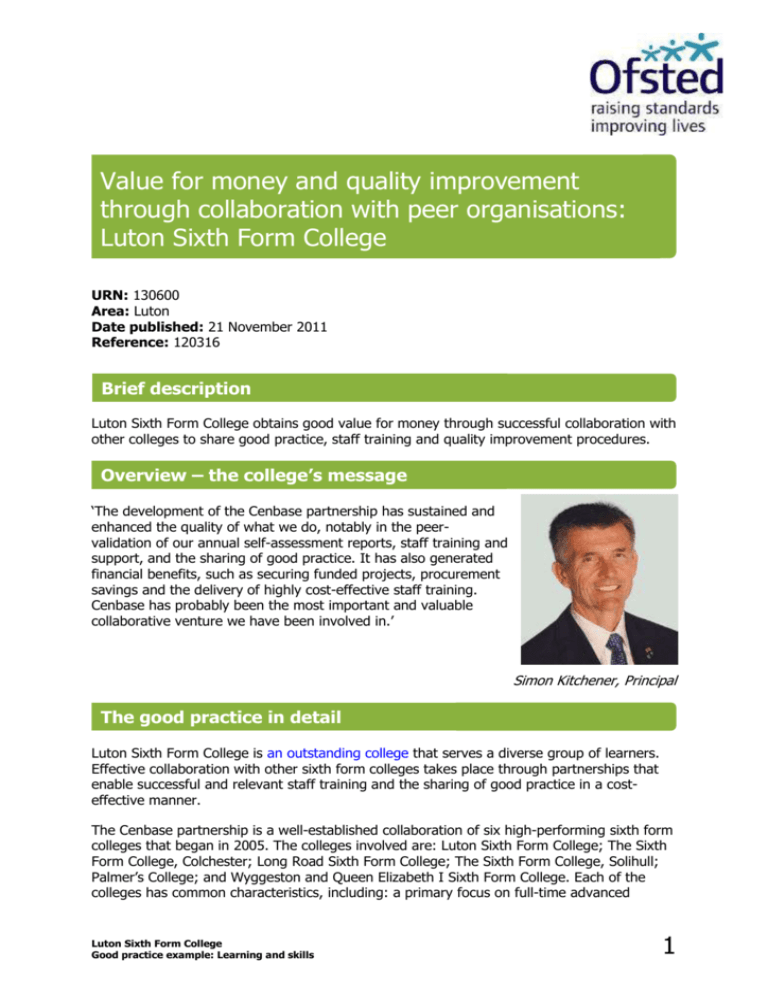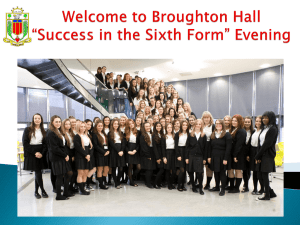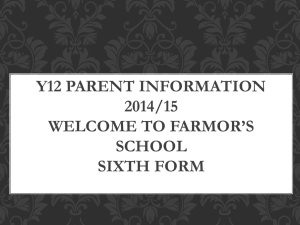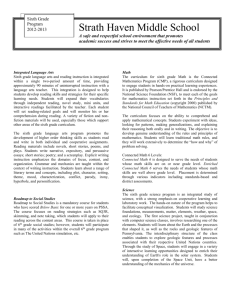Luton SFC - Good practice example
advertisement

Value for money and quality improvement through collaboration with peer organisations: Luton Sixth Form College URN: 130600 Area: Luton Date published: 21 November 2011 Reference: 120316 Brief description Luton Sixth Form College obtains good value for money through successful collaboration with other colleges to share good practice, staff training and quality improvement procedures. Overview – the college’s message ‘The development of the Cenbase partnership has sustained and enhanced the quality of what we do, notably in the peervalidation of our annual self-assessment reports, staff training and support, and the sharing of good practice. It has also generated financial benefits, such as securing funded projects, procurement savings and the delivery of highly cost-effective staff training. Cenbase has probably been the most important and valuable collaborative venture we have been involved in.’ Simon Kitchener, Principal The good practice in detail Luton Sixth Form College is an outstanding college that serves a diverse group of learners. Effective collaboration with other sixth form colleges takes place through partnerships that enable successful and relevant staff training and the sharing of good practice in a costeffective manner. The Cenbase partnership is a well-established collaboration of six high-performing sixth form colleges that began in 2005. The colleges involved are: Luton Sixth Form College; The Sixth Form College, Colchester; Long Road Sixth Form College; The Sixth Form College, Solihull; Palmer’s College; and Wyggeston and Queen Elizabeth I Sixth Form College. Each of the colleges has common characteristics, including: a primary focus on full-time advanced Luton Sixth Form College Good practice example: Learning and skills 1 provision for students aged 16 to 18; provision with at least 1,500 learners; existing provision of high or outstanding quality; active curriculum development; and a lack of geographical proximity. This latter point is regarded as an important element of the partnership. ‘One of the reasons the partnership works so well is because the partner colleges are geographically isolated from each other,’ says Chris Nicholls, the Vice Principal. ‘This enables a greater degree of transparency and sharing of information that might be difficult with the college up the road, as there is no direct competition Chris Nicholls, Vice Principal between the institutions. We share sensitive information with our partners such as benchmarking results and teaching costs.’ One of the most important aspects of the partnership is the joint training that takes place. Each year, two colleges host a day’s training for staff in the partnership and this event has increased in size and the number of staff involved. In June 2011, Luton Sixth Form College and Wyggeston and Queen Elizabeth College, Leicester, were the hosts to around 450 staff. Costs for the event are extremely low, totalling under £40 per delegate, including travel and refreshments. As Marc Hulbert, Head of Professional Development remarked, ‘this is extremely good value for such high-quality training that is customised and highly relevant to staff. It is far less costly than more traditional staff training that often involves sending a small number of staff to external conferences and training events which may run up bills of several hundred pounds’. Most staff travel to the host college by coach. A very broad range of events took place in over 40 workshops at the annual training day in 2011, where teachers, support staff and managers worked together, with facilitators, on common issues. Subject teachers from each college have the opportunity to get together with their peers and hone their teaching and learning techniques, share learning resources including information and learning technology (ILT) materials, develop assessment techniques and explore curriculum developments. Some groups of teachers form subject networks and have ongoing contact at other times during the year. Teachers of minority subjects such as philosophy, who may not often work with other teachers of their subject, particularly value the opportunity to meet with fellow practitioners from other colleges and share good practice. Support staff also meet others from participating colleges. Those responsible for IT services meet to compare college strategies for ILT and plans for future technologies. Other workshops offer the opportunity for staff to sample sessions on time management, more effective presentational skills and the challenges involved when moving from a teaching to a management role. John Ramm, Head of Social Sciences at Luton Sixth Form College, remarked, ‘The Cenbase day was a fine example of active collaboration. It was not just an occasion to meet colleagues facing similar challenges, and that was valuable in its own right, but an opportunity to exchange ideas and share good practice. The Cenbase event was about connecting with each other, about making useful links.’ The Cenbase partnership also provides the opportunity for principals and governors to meet and share ideas regularly and engage in other projects. Simon Kitchener described how ‘examination and finance staff from the colleges work together to accrue procurement 2 Luton Sixth Form College Good practice example: Learning and skills savings. For example, using the thousands of students we have taking examinations as leverage has enabled us to negotiate discounts with examination boards for entry fees’. Other projects taking place include work on performance management systems and developing procedures for listening to the students’ voice. An ongoing piece of work each year that colleges feel is particularly valuable is senior staff participating in moderation panels where they act as critical friends for each other’s self-assessment reports. The college’s background Luton Sixth Form College was the first sixth form college to be established in the country in 1966. It is a large sixth form college providing a wide range of academic and general vocational programmes to 2,400 fulltime students aged 16 to 18. The college is the sixth form centre for nine of the 10 secondary schools and the two academies in Luton. It serves a diverse community in which 35% of the local population and 62% of college students are of minority ethnic heritage. Many students come from disadvantaged backgrounds. Are you thinking of putting these ideas into practice; or already doing something similar that could help other providers; or just interested? We'd welcome your views and ideas. Get in touch here. To view other good practice examples, go to: www.ofsted.gov.uk/resources/goodpractice Luton Sixth Form College Good practice example: Learning and skills 3









